Bend Testers
Which Bend Tester is Best for Your Application?
- The Model BT1D is our newest bend tester. It uses a new generation design that replaces and improves upon our classic Model BT1B design. It is adjustable for the typical range of tests required by fabricators, manufacturers, contractors and schools. It is moderately portable.
- The Model BT1C is very portable but less versatile than the BT1D. It is intended for applications where the material and thickness to be bent are usually the same. While this model is not adjustable for different radii, it can be converted by interchanging additional parts.
- The Model BT3 is the top of the line. It uses the wraparound bending principle to produce inside bend radii in the range of 0.032 to 1.875 inches. It is intended for laboratory use where a wide range of welded materials and thicknesses must be tested.
- What mandrel size should you use? Use our table to find the code reference for your application.
All BT1 Series Bend Testers share these common features
- The weld surface to be evaluated never contacts any hard surface during bending
- Bottom ejection design assures that the specimen will not get stuck
- Hardened steel rollers with heavy-duty needle bearings do not drag on the specimen
- A 1.500 in. diameter, hardened, tool steel mandrel is provided as a standard accessory
- Optional mandrels are available to meet any welding code or standard
Model BT1D Bend Tester
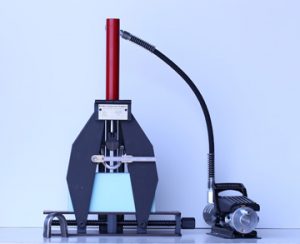 |
|
Model BT1C Bend Tester
|
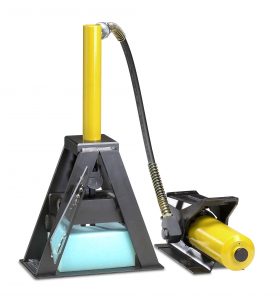 |
Model BT3 Bend Tester
Why Fischer Wraparound Bend Testers are Special
-
No one else in the industry offers such a wide selection of standard wraparound mandrels. The Model BT3 is not limited to a few bending radii. It will not become obsolete if your code/standard requirements change. It is adjustable for any bend radii between 1/32 and 2.5 inches. Shown below is the 1/16 inch diameter mandrel we developed for the Naval Surface Warfare Center. Also shown is a 0.016 inch thick titanium specimen tested using this mandrel.
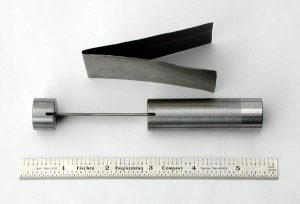
- The Model BT3 Bend Tester uses a unique method for wrapping the bend specimen around the mandrel. Specimens are forced to conform to the mandrel surface. This is especially useful for specimens from dissimilar metal weldments or those with significantly different weld and base metal strengths. When tested in a standard guided bend tester, primary bending will occur in the weakest material. The effective radius in the bend can become so small that the maximum elongation property of the material is exceeded, resulting in fracture.
- For mandrels larger than 1/2 inch, a knurled surface is used to drive the specimen being tested. For routine bends, no special clamping or specimen preparation is required. We call this “quick clamping”.
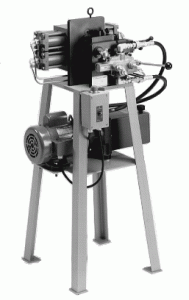 |
|
Fischer Mandrels
|
Why Fischer Mandrels and Mandrel Adapters are Special All mandrels are hardened tool steel. All BT1 Series mandrels include our patented, knurled surface, to reduce the possibility that the specimen will slip sideways during bending. This works in most cases. For severe cases of the dissimilar weld and base metals, either longitudinal bend specimens or the Model BT3 Bend Tester is the better choice. The numerical portion of the mandrel part number is the mean outside diameter, in inches, of the mandrel. The smaller mandrels require an adapter. We have the largest selection of standard mandrel sizes in the industry. Please see our price sheet for a listing. For special sizes, call for price and delivery. We may have already made the size you need. If not, we can! |
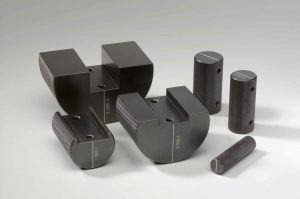 |
||||||||||||||||||||||
|
Bend radius is calculated by using the code or standard, the material being welded, and the material thickness. Each code and standard lists the required bend radius and the associated roller spacing to be used for a given material and thickness. None of the commercial or military codes or standards requires you to bend any specimen thicker than 3/8 inch (1/2 inch for API 1104). Even if you are testing 1-1/2 inch thick material, the codes instruct you on how to prepare side bend specimens which are only 3/8 inch thick (1/2 inch for API 1104). These 3/8 (1/2) x 1-1/2 inch side bend specimens are easily bent using a 1-1/2 inch diameter mandrel (3-1/2 inch for API 1104 |
|
||||||||||||||||||||||
- All prices are F.O.B. Dayton, Ohio.
- Terms: first order cash, check or credit card, then N30, with approved credit.
- Prices and Specifications are subject to change without notice.
- 15% Minimum restocking charge for all returned goods (no returns of special order items).
- Minimum Order is $100.
- Most major credit cards accepted.
- The prices listed here are for sales within the US and Canada. Sales to other countries may be higher because of additional costs required for power modification, international transactions and shipping.
California Residents – Click here for the Proposition 65 Warning
Send mail to[email protected]with questions or comments about these services.
